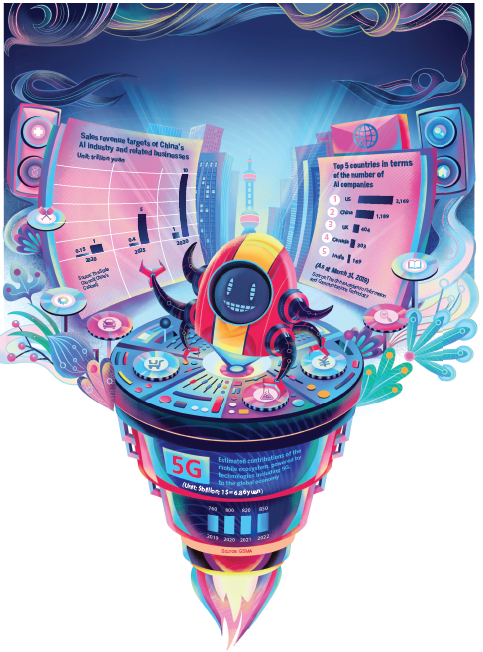Pioneering daily use of cutting-edge tech


China spearheads the world's efforts to marry AI with 5G for commercial applications across industries
In Fuzhou, capital of East China's Fujian province, a white, 5G-enabled, sensor-rich agricultural robot moves between two rows of leafy greens in a greenhouse, collects data about the plants, and feeds it back to the control room.
The farm robot has been successfully tested for compatibility with the 5G mobile communication technology.
What this means in real terms is this: pictures and other data can be transmitted from farmland in almost real time. Latency, or the time lag, is no longer than just one-hundredth of a second.
This allows the data to be analyzed by computers enabled by artificial intelligence, or AI, in the control room more efficiently, according to the Fujian Academy of Agricultural Sciences and Fujian Newland Era Hi-Tech Co, the two entities that developed the robot.
As if to soften the aura of its high-tech innards, the robot sports an eye-pleasing external look of an adorable cartoon, with its smooth, round base, which hides wheels underneath it, adding to the overall cuddly effect.
The robot can move in a smooth, fluid, jerk-free motion in all directions. It can inspect farms automatically and collect data samples used to power various applications. It can determine plants' health condition and decide if pest control measures are warranted. Odds are, in the not too distant future, the 5G super robot can even pick fruit with one of its bionic hands.
The robot is part of broader trend in China, which is this: tech companies are teaming up with a variety of industries-agriculture, automobile, healthcare, what have you-to explore possibilities of combining 5G and AI to revolutionize the traditional sectors of the economy.
From conducting the world's first 5G-enabled surgery on a human and transmitting 8K ultra-high-definition TV content through 5G networks to piloting self-driving buses and cars, China is pioneering cutting-edge technologies for commercial use.
The high-tech push is expected to be accelerated now that the nation kicked off the 5G era last month.
Yang Kun, an expert at the China Academy of Information and Communicat ions Technology, a research institute based in Beijing, said 5G enables data transfers at speeds at least 10 times faster than 4G, so it is possible to gather high-quality data quickly, which is necessary to ensure AI is effective.
"AI applications have existed before the commercial use of 5G, but it is the superfast speed, gigantic computing capacity and massive device connectivity of 5G that will spawn the use of AI in more sectors and on a far larger scale," Yang said.
Agreed Lyu Tingjie, a professor at the Beijing University of Posts and Telecommunications. According to him, 5G's responsive speed can empower mission-critical applications that were impossible with 4G networks.
"When a needle pinches your finger, it takes one hundredth of a second for you to feel the pain. And theoretical latency of 5G is one-tenth of that. Only with such speed can remote surgeries and autonomous driving see wider applications," Lyu said.
In March, a patient with Parkinson's disease underwent China's, and possibly the world's, first 5G-based remote surgery.
With technological support from Huawei Technologies Co and China Mobile, a doctor in Sanya, Hainan province, remotely operated surgical instruments to implant a deep brain stimulator known as a "brain pacemaker" into the patient in Beijing around 2,500 kilometers away.
Ling Zhipei, chief physician of the First Medical Center of the Chinese PLA General Hospital, conducted the three-hour surgery. "The 5G network has solved problems like video lag and remote control delay experienced under the 4G network, ensuring a nearly real-time operation," Ling said.
On June 6, China granted commercial 5G licenses to China Mobile, China Telecom and China Unicom, the nation's top three telecom carriers by the number of subscribers. State-owned China Broadcasting Network Corp also received the 5G license.
China is already regarded the leader in rolling out 5G applications. The nation is forecast to invest $184 billion in 5G by 2025, according to a report released by the Global System for Mobile Communications Association, which represents the interests of more than 750 mobile operators worldwide.
Such investments are expected to power China's big AI push. The nation is implementing an AI development plan that aims to build a 1 trillion yuan ($146 billion) AI core industry by 2030, which is expected to stimulate related businesses to the tune of 10 trillion yuan.
Digital technologies such as AI, next-generation network security, robotics, blockchain, internet of things, 3-D printing and virtual reality all depend on data, and 5G can address this need for data collection and its quick, smooth transmission, said Zhong Zhenshan, vice-president of emerging technology research at the China branch of International Data Corp.
Wang Xianchang, a professor at Jilin University, said the most important use of AI is to allow machines to automatically make decisions. The best application scenario in civil use is self-driving vehicles. And 5G will allow such decisions to be made properly and more reliably. When a car runs into emergencies like a pedestrian suddenly jaywalking, a delay in seconds of data transmission among sensors equipped within the car will likely cause a potentially grievous, even fatal, accident. 5G is here to prevent such things from happening, Wang said.
Currently, self-driving buses are under test in a string of cities across China, including Shenzhen, Guangdong province, and Changsha, Hunan province.
Chinese online search engine operator Baidu Inc announced plans as early as in December 2017 to mass-produce autonomous buses for designated areas. It will partner with bus manufacturer Xiamen King Long United Automotive Industry Co.
In East China's Anhui province, carmaker Anhui Jianghuai Automobile Co Ltd teamed up with Baidu to develop cars with auto-pilot systems.
Xiang Ligang, director-general of the Information Consumption Alliance, said the commercial use of 5G will impart further momentum to AI, but more discussions are needed to talk about the legal and ethical issues surrounding its wider applications.
China took a step in that direction in June when it issued new guidelines for scientists and lawmakers to promote the "safe, controllable and responsible use" of AI for the benefit of mankind.
Xue Lan, dean of Schwarzman College at Tsinghua University and chairman of the committee that issued the guidelines, said AI has raised many new and complex issues, like data privacy, machine ethics, safety, risks and misuse like spreading misinformation using "deepfake videos", and AI-manipulated footage.
But AI is not as uncontrollable or mystical as some people appear to presume, experts said. The regulatory or supervisory mechanisms could steer it in the right direction and leave enough room for exploration, course-correction, remedies and calibrated growth, analysts said.




































